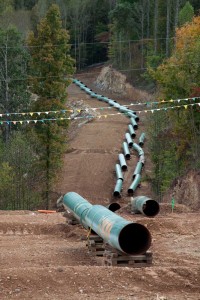Update: April Keating reports that FERC has informed her that people can make comments to FERC up until the day a pipeline is approved. So, continue piping up! FERC is especially looking for comments during the EIS period, which is the time the agency is trying to identify problems. Pipe up!
FERC is preparing an environmental impact statement (EIS) for the proposed Mountaineer Express Pipeline. That’s why it is holding public scoping meetings and has a written public comment period underway. Any comments you make during a scoping meeting or in letters must be addressed in the EIS, so do comment thoughtfully and ask others to come out to speak, too.
Points you may want to cover:
It is FERC’s duty to fully assess all alternatives to lessen or avoid environmental impacts. The EIS should include a review of alternatives using existing pipelines and existing corridors, as well as the alternative of no pipeline at all.
FERC should look at the cumulative impact of all pipelines proposed for West Virginia and surrounding states.
The pipeline impacts need to be evaluated during all phases of the project, from construction through completion. FERC should evaluate impacts during construction, including the potential use of fly ash for backfill, and cumulative impacts following the completion of the pipeline, such as increased fracking and the impacts to water, wildlife and human health, more radioactive waste in our landfills and increased global warming.
FERC should evaluate whether it is a public necessity to use eminent domain to build an additional pipeline when there are existing pipelines and corridors already in place, especially in light of the fact that pipeline construction would allow for the export of methane.
FERC should examine what implications this pipeline with have in terms of climate change and what it will do to lock West Virginia into continued reliance on fossil fuels, especially in light of the rapid worldwide growth of renewal energy an energy efficiency measures.
In light of the above, FERC should examine the moral issues involved with this pipeline and what allowing its construction would mean for future generations in terms of impacts on the climate and water resources. Further, isn’t it better to leave some gas in the ground for future generations, rather than ship it out overseas as fast as possible, for no need other than the fossil fuel industry’s “need” for more profits?
Compression stations and construction will diminish air quality and have increased noise levels. They impact human health negatively. The proximity of the compressor station and pipeline to communities and nearby residences and how to mitigate adverse effects should be fully evaluated.
Because of the flammability of methane, the pipeline is at risk of an explosion. FERC should consider the blast radius should an explosion occur and how many residences are within the blast radius. Further, they should evaluate mitigation efforts to avoid populated areas. Evaluate the health risks associated with living near a compressor station or a leaking natural gas pipeline. FERC also needs to examine the capacity for local first responders (often volunteers) and hospitals to respond should there be an explosion (or, when there is) along the proposed pipeline’s route.
Constructing this proposed pipeline will increase forest fragmentation, so FERC should evaluate how many acres of forest will be fragmented and the impact on local wildlife.
FERC should inventory rare, threatened and endangered species that rely on habitat in the proposed route. For example, the cerulean warbler’s population has declined dramatically in recent decades and the proposed pipeline’s route could cut swaths through prime habitat for this bird species. FERC should evaluate how the proposed pipeline will impact at-risk species through disturbance, habitat loss, breeding, etc. and how the negative impacts will be mitigated or avoided.
FERC should also evaluate the impacts of increased sedimentation from runoff and loss of topsoil during construction.
WV is known for its outdoor recreational opportunities. FERC should evaluate how the pipeline would impact outdoor non-motorized recreation and tourism.
The proposed pipeline would cross streams, rivers and wetlands. FERC should evaluate how many crossings will occur, the acres of wetlands to be disturbed and how the pipeline will impact springs and drinking water sources. Impacts to freshwater streams would also affect fisheries resources, which is an important part of the state’s ecology and tourism. With impacts to the hydrology there could be cumulative effects such as flooding, so FERC should evaluate how the construction impacts from disturbing streams and wetlands will impact flood events
WV contains many cultural resources, such as Native American and civil war artifacts. FERC should examine how the proposed pipeline’s construction will impact these cultural resources.
Our state hosts ecologically diverse vegetation which can provide economic benefits such as ginseng and several tree species. FERC should evaluate how the pipeline will impact these and other important vegetation species. West Virginia has diverse wildlife populations from large mammals to small salamanders that play an important role in the ecosystem. FERC should evaluate how the construction will impact West Virginia’s wildlife species including breeding and nesting grounds, migration routes, and increased predation from the proposed pipeline corridor.
Here’s some of what people said at FERC scoping meetings over the Atlantic Coast Pipeline:
FERC Hear This on Atlantic Coast Pipeline
FERC Hear This: Pipeline Risks to Rural Folks Too High
WV Scoping Meetings for Atlantic Coast Pipeline in Elkins & Bridgeport










